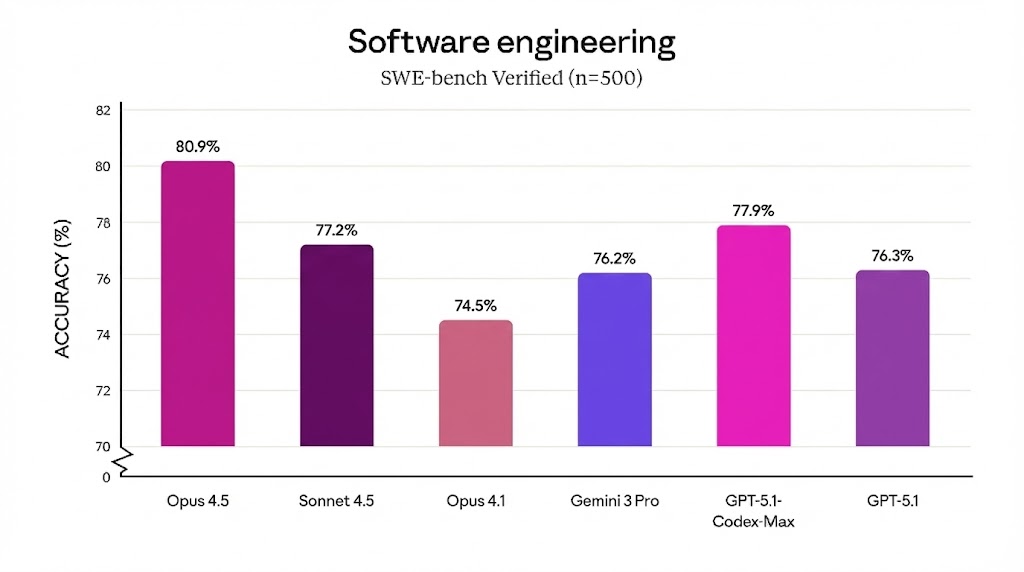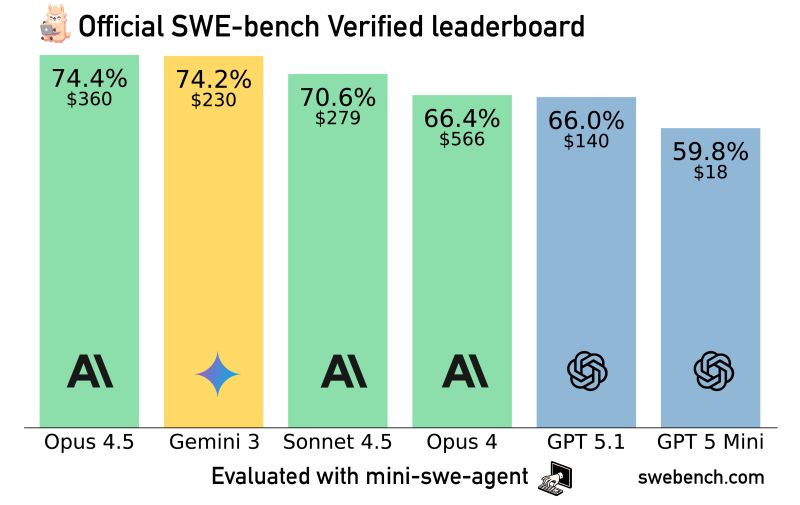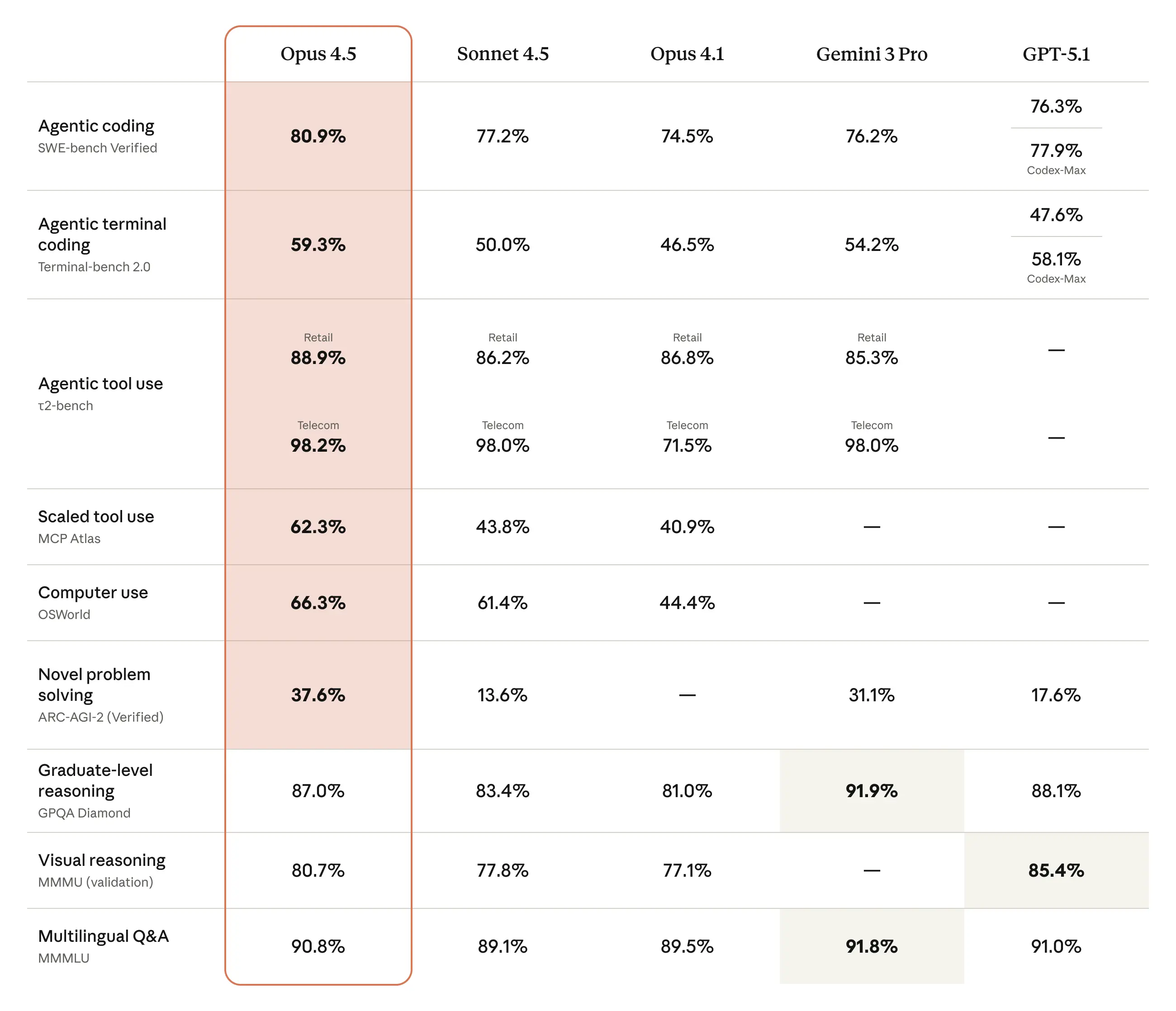Anthropic's new Claude Opus 4.5 model signals a potentially substantial leap forward in artificial intelligence, offering smarter, more efficient support for coding, research, and productivity tasks. Anthropic presents this release as more than just an upgrade but as a preview of how advanced AI will transform the way professionals across industries work and innovate.
Image Credit: Anthropic (Restyled with Gemini Image Pro)
Breakthroughs in Coding and Agentic Workflows
With Opus 4.5, developers gain access to the top real-world performer in software engineering benchmarks. According to Anthropic, users are highlighting the model’s ability to navigate ambiguity, reason through complex decisions, and autonomously address multi-system bugs. Tasks once deemed impossible are now within reach, as Opus 4.5 demonstrates an intuitive understanding that many describe as it just “gets it.”
- Best-in-class coding: Delivers superior code quality, outperforms internal benchmarks, and reduces token usage for efficient, large-scale workflows.
- Planning and execution: Enables long-horizon, multi-step tasks with improved planning and reliable results through sustained sessions.
- Efficiency and cost: Competitive pricing at $5 or $25 per million tokens expands access while increasing speed and keeping costs in check.

Image Credit: View Kilian Lieret (Princeton Researcher - LinkedIn). It is interesting to this author that Anthropic's evaluation appears to have cherry picked the results to create a larger gap between Gemini 3 and Opus 4.5. Which result do you trust, any of them? Personally, until I put the model to the test in my own workflows, these benchmarks mean very little any longer.
General Intelligence and Creative Problem Solving
Advancements in Opus 4.5 extend far beyond code as the model excels in vision, reasoning, and mathematics, leading benchmarks in most programming languages and outperforming past iterations across agentic and research tasks. Its performance even surpassed all human candidates on Anthropic’s internal engineering test, demonstrating adaptability and keen technical judgment under pressure.
- Creative solutions: Finds policy-compliant, innovative workarounds that evaluators hadn’t anticipated, proving its value in real-world scenarios.
- Long-context performance: Handles long-form storytelling, intricate financial models, and 3D visualizations with consistency, addressing areas where earlier models faltered.
Advances in Safety and Alignment
Safety is central to Opus 4.5’s design. Anthropic has engineered this model to be the most robustly aligned and secure in its portfolio, outperforming competitors in resisting prompt injection and undesirable behaviors. Rigorous safety testing ensures reliability, even under adversarial conditions.
- Robust alignment: Sets new standards for safe AI deployment in critical environments, building customer trust for high-stakes workflows.
- Transparency: System cards and public benchmarks empower users to independently assess both safety and capability.

Image Credit: Anthropic
Platform and Product Enhancements
The release brings new capabilities across the Claude Developer Platform, Claude Code, and consumer applications. Developers benefit from tools for long-running agents, enhanced integrations with Excel and Chrome, and a new effort parameter for balancing speed with depth of reasoning.
- Token efficiency: Uses fewer tokens to deliver equal or improved results, supporting scalable, cost-effective deployments.
- Enhanced flexibility: The effort parameter allows users to tailor Opus 4.5’s performance to their task speed or thoroughness, as needed.
- Expanded access: Higher usage limits and the removal of Opus-specific caps ensure more users can leverage advanced AI daily.
Industry Impact and Future Directions
Anthropic views Opus 4.5 as a milestone toward AI that autonomously manages complex projects, automates office tasks, and becomes a trustworthy research partner. The company continues to examine the societal and economic effects of such technology, acknowledging its transformative potential for the future of work.
Competition with Gemini Pro 3
Anthropic is directly answering the recent release of Google's Gemini 3 model which has been claimed to offer superior performance in coding and reasoning over Sonnet 4. While Google has made waves, and Gemini is certainly a powerful model, it has failed to displace Anthropic and GPT Codex as the model of choice for many developers like myself.
Opus 4.5 points to a future where we are always edging our models towards a performance pinnacle and evaluating the difference may be the challenge that many of us sideline. I personally prefer Anthropic models for coding and creative content generation but GPT and Gemini have excelled at scientific reasoning in my workflows. Yet releases like Opus 4.5 make it clear that the competition is stiff and the winner may not be the one with the best stats but rather then one that can reduce friction and enable developer consistency.
Takeaway
Claude Opus 4.5 redefines what’s possible in general AI, combining advanced capabilities with safety and efficiency. Its strengths in coding, reasoning, and alignment mark a shift toward more autonomous, intelligent digital agents, making state-of-the-art AI accessible for a wider audience. As Anthropic advances its technology, Opus 4.5 paves the way for even greater innovations in how we use AI at work and beyond.
Source: Anthropic (Claude Opus 4.5 announcement)

Claude Opus 4.5: Setting a New Benchmark for AI Productivity